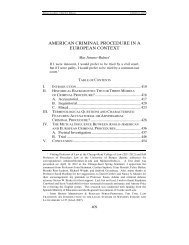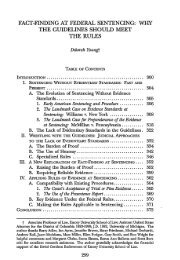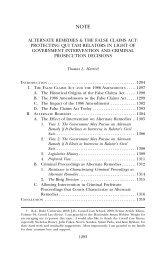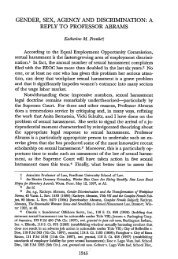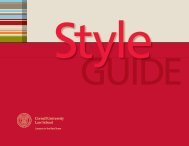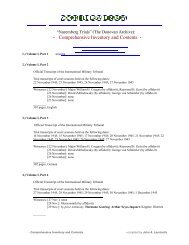JUDICIAL CLERKSHIP HANDBOOK - Cornell University Law School
JUDICIAL CLERKSHIP HANDBOOK - Cornell University Law School
JUDICIAL CLERKSHIP HANDBOOK - Cornell University Law School
Create successful ePaper yourself
Turn your PDF publications into a flip-book with our unique Google optimized e-Paper software.
all federal appellate and some district courts are authorized a varied number of staff<br />
attorneys, who perform duties for the entire court. These may be one‐ or two‐year<br />
clerkships, or, in some cases, career positions.<br />
A vast number of clerkships are available on the state level, and as the size and structure of<br />
state court systems vary, so too do the type and availability of state court clerkships. Some<br />
state court clerkships are one year positions (e.g., the New Jersey Supreme Court) and some<br />
are two year positions (e.g., the New York Court of Appeals Central Staff clerkships). Many<br />
state courts hire clerks as permanent staff.<br />
There are a lot of advantages to a state court clerkship. First, clerking for a state court<br />
judge quickly establishes ties to the local legal community. This is especially important,<br />
even if you had previous ties to the geographic area. Local practitioners may take the view<br />
that a state clerkship evidences a particularly high level of commitment to the area. Also,<br />
an important element in considering a state court clerkship is the type of practice you want<br />
to move on to after your clerkship is over. Clerking in a state court will give you an<br />
opportunity to gain insight into firms for whom you might want to work when your<br />
clerkship ends. Or, if you are attracted to working for a state agency, law firm or public<br />
interest organization that operates in the state‐court venue, a state court clerkship is<br />
invaluable.<br />
THE BENEFITS OF A <strong>JUDICIAL</strong> <strong>CLERKSHIP</strong><br />
Judicial clerkships are an outstanding learning experience and provide a good bridge<br />
between law school and the practice of law. A judicial clerkship provides the opportunity to<br />
hone research and writing skills while being exposed to a wide variety of legal issues.<br />
Furthermore, a clerkship offers insight into the judicial process and provides practical<br />
familiarity with the litigation process. Because law clerks have the opportunity to observe a<br />
large number of attorneys in practice, the experience exposes them to a wide range of legal<br />
styles and abilities. It may also give insights into local legal employers that can inform<br />
decisions about permanent employment.<br />
A significant benefit of a judicial clerkship is the mentoring relationship that often develops<br />
between a judge and his or her law clerks. The relationship is almost always a very<br />
intensely personal one, and former clerks will tell you that the professional and personal<br />
relationship has lasted throughout their careers.<br />
The experience and training obtained in a judicial clerkship is valued by most law firms,<br />
public interest organizations, government agencies and corporations. For instance, 33% of<br />
the partners at Cleary, Gottlieb, Steen and Hamilton in New York City began their careers as<br />
judicial law clerks. The U.S. Department of Justice actively recruits judicial law clerks for its<br />
Honors Program (the only avenue through which entry level attorneys are hired at DOJ).<br />
Most public interest fellowship programs value judicial‐clerkship experience. Judicial<br />
clerkships are especially beneficial to those interested in pursuing an academic career.<br />
Sixty‐three percent of the permanent <strong>Cornell</strong> <strong>Law</strong> <strong>School</strong> faculty were judicial clerks.<br />
Finally, even for those who do not seek a career in litigation, clerkships can be quite<br />
2 | P age




